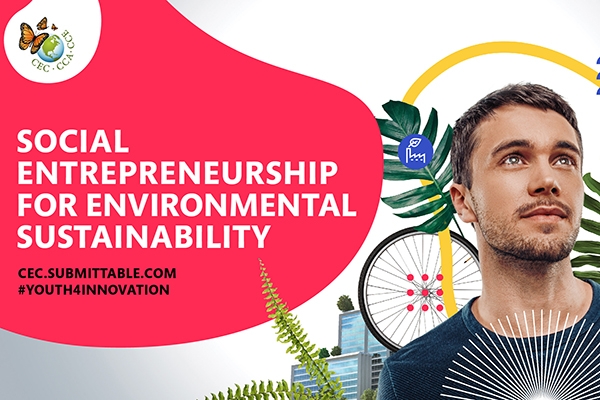Winners of the 2020 CEC Youth Innovation Challenge Announced
Selected from nearly 200 participants, the winners will present their groundbreaking solutions to the CEC Council and receive C$5,000 in seed funding.
Montreal, 17 June 2020— The Commission for Environmental Cooperation (CEC) is pleased to announce the winners of the fourth annual Youth Innovation Challenge, selected from nearly 200 submissions from Canada, Mexico and the United States. This marks the first time that all winning solutions have been submitted by women. The three winning submissions are:
- Monique Chan, Eva Perchanok, and Justice Walz, Canada: "Bruized" – A woman-run food enterprise created to combat food-waste by redirecting “imperfect” food from the landfill and creating healthy plant-based snacks instead.
- Blanca Valeria García Nicanor, Marco Vinicio Alemán Pérez, Minerva Valier Camacho, and Karime Guillen Libien, Mexico: NoPlastic – A 100% biodegradable and compostable bioplastic that uses nopal cactus and wastes from food crops as input to tackle the problem of single-use, long-lasting plastics.
- Ciara May, United States: Rebundle: Capturing the life-cycle of synthetic hair products – A plant-based synthetic hair brand that replaces harmful hair products with plant-based and compostable options.
The 2020 CEC Youth Innovation Challenge invited North American youth aged 18 to 30 to propose innovative solutions to address environmental challenges and opportunities for communities in Canada, Mexico and the United States.
This year, the 4th annual challenge focused on social entrepreneurship for environmental sustainability. North American youth were challenged to submit innovative technological, scientific, and business solutions that can advance sustainability and green growth.
"Innovation plays a crucial role in supporting sustainable development in communities across North America,” said Richard Morgan, Executive Director of the CEC. “More and more, youth are paving the way in finding solutions to our environmental challenges. We are very proud of this year’s winners, who have proven that youth can bring new perspectives to environmental sustainability.”
The Youth Innovation Challenge was held ahead of the 2020 CEC Council Session, which will take place virtually on 26 June 2020. Be sure to tune in to our live webcast to see the winners present their concepts to North America’s top environmental officials.
For details, visit the CEC’s 2020 Youth Innovation Challenge webpage. You can also follow the CEC on Facebook, Twitter and Instagram for updates on the Council Session and to ask questions or share your thoughts about North American environmental cooperation.

About the CEC
The Commission for Environmental Cooperation (CEC) was established in 1994 by the governments of Canada, Mexico and the United States through the North American Agreement on Environmental Cooperation, a parallel environmental agreement to NAFTA. As of 2020, the CEC is recognized and maintained by the Environmental Cooperation Agreement, in parallel with the new Free Trade Agreement of North America. The CEC brings together a wide range of stakeholders, including the general public, Indigenous people, youth, nongovernmental organizations, academia, and the business sector, to seek solutions to protect North America’s shared environment while supporting sustainable development for the benefit of present and future generations
The CEC is governed and funded equally by the Government of Canada through Environment and Climate Change Canada, the Government of the United States of Mexico through the Secretaría de Medio Ambiente y Recursos Naturales, and the Government of the United States of America through the Environmental Protection Agency.